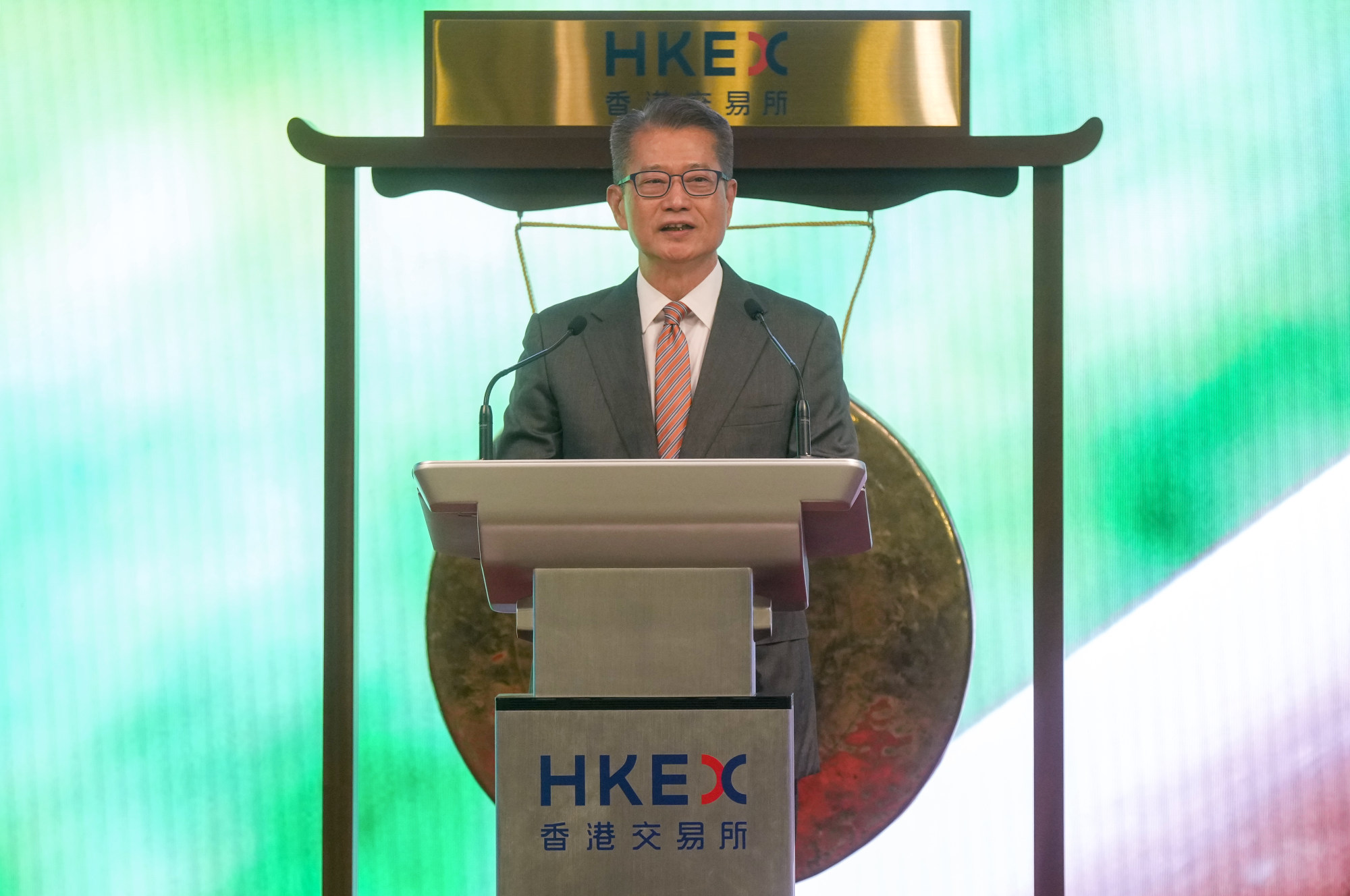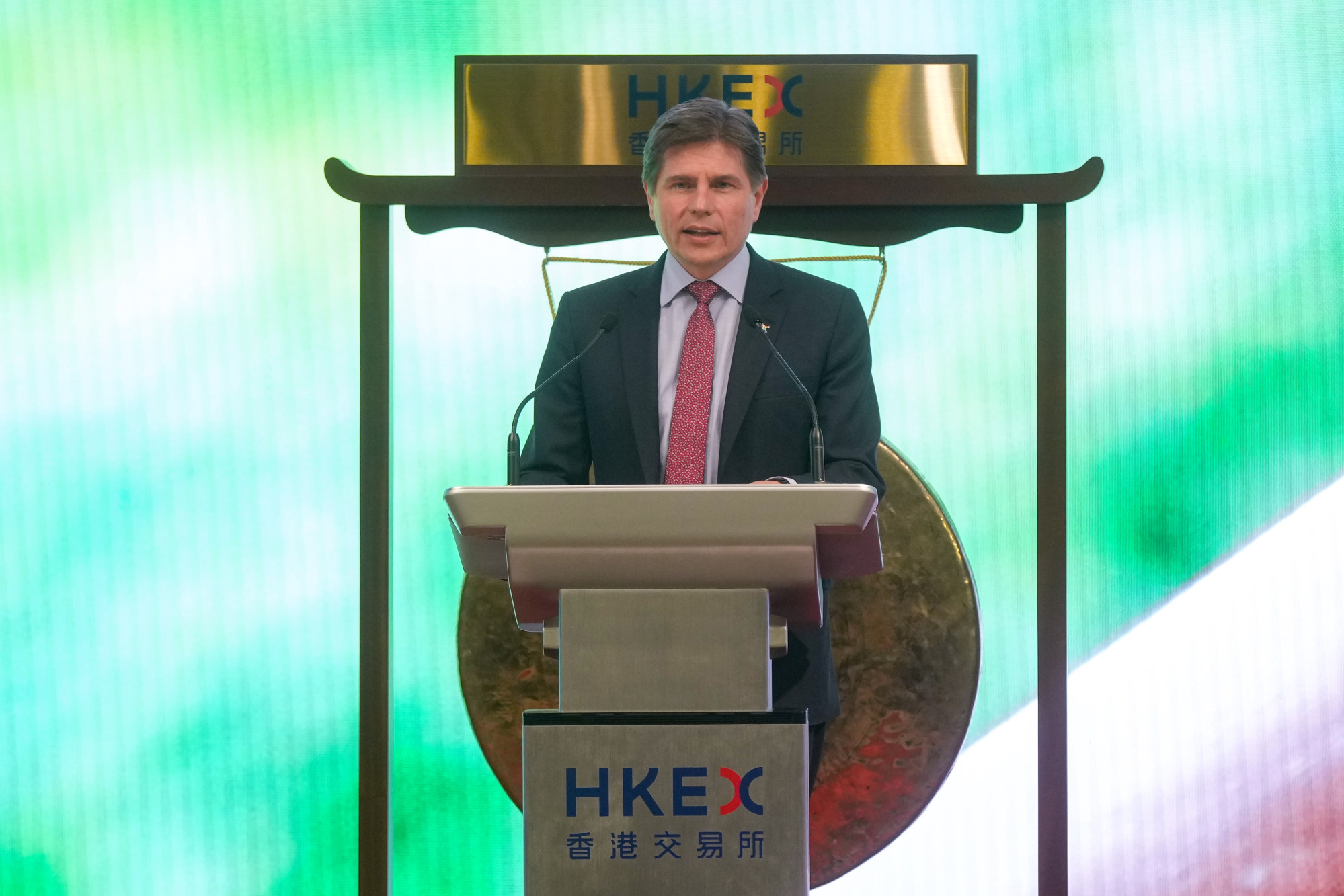
Alibaba, Tencent, Ping An among 24 Hong Kong-listed stocks to kick off Dual Currency Model in dollars and yuan
- The 24 listed companies have a combined capitalisation of US$1.5 trillion, or 35 per cent of the Hong Kong stock market
- The yuan-share counter model is expected to boost turnover by attracting overseas investors and contribute to the Chinese currency’s internationalisation
Hong Kong kicked off a much-heralded plan on Monday to allow stocks listed on its exchange to be quoted in the local dollar and the yuan, taking another step to increase the city’s appeal amid a downbeat market.
Yuan-denominated transactions of the 24 companies stood at 0.6 per cent of their Hong Kong dollar counters’ turnover at HK$29 billion, according to HKEX data. Still, both the exchange and local brokers deemed it as a good debut.
“It is a good start,” said Gordon Tsui Luen-on, director of the Hong Kong Securities and Investment Institute. “Today’s transactions are a small step and it will only get bigger as the yuan’s internationalisation progresses.”
China Mobile led the day’s proceedings, with 55.2 million yuan worth of shares changing hands. Tencent ranked second at 36.62 million yuan, followed by Ping An Insurance in third place at 17 million yuan. CNOOC at 10.08 million yuan and Meituan at 9.28 million yuan rounded off the top five companies with the highest turnover.
“The first-day performance has reasonably met expectations and it will improve over time when the mainlanders can use the onshore yuan to trade the yuan shares in Hong Kong via the Southbound stock connect at a later stage,” said Tom Chan Pak-lam, the permanent honourable president of the Institute of Securities Dealers.
An HKEX spokesman said the first day of trading “was smooth and the market warmly welcomed this new initiative, providing customers with greater choice and supporting the long term internationalisation of the yuan”.
The approval for Hong Kong stocks to be tradeable in the local dollar and yuan “comes at a time of [rising] strategic importance of the renminbi in flows, liquidity and popularity,” Chan said during a launching ceremony attended by hundreds of brokers, bankers and executives. “Hong Kong will play a pivotal role in this change, and we are keen to grasp the opportunities ahead [because Hong Kong] has long been the offshore renminbi trading hub in terms of liquidity, trade settlement or product variety.”

The model gives investors the choice of trading in either currency for the two dozen companies with a combined market capitalisation of HK$12 trillion (US$1.5 trillion). The companies’ shares make up 35 per cent of the total value on the Hong Kong exchange and account for 40 per cent of total turnover.
Each yuan-counter stock will prepend an “8” – a number associated with wealth in Chinese culture – to the corresponding stock codes of the Hong Kong dollar counter. The two categories of shares will be fungible, with the same voting rights and dividend eligibility.
The ability to quote shares in renminbi “offers flexibility and liquidity for shareholders and potential investors”, according to a statement by the Chinese phone maker Xiaomi, whose yuan shares were designated the new code “81810” while its Hong Kong dollar share stock code remains “1810.”
The nine participating financial firms include BOCI Securities and CICC, which will act as market makers and offer buy-sell quotes. However, investors can also trade the yuan shares via their own brokers or banks.
Initially, only Hong Kong or international investors can trade the yuan shares, but mainland investors will later be allowed to trade via the southbound stock connect scheme. The HKEX did not offer a timetable for mainland participation.

“The RMB-HKD dual counter is expected to provide a positive boost to Hong Kong cash equity trading volumes, backed by a possible increase in southbound inflows from mainland China and increased activity by international investors that hold large balances of offshore yuan,” said Charles Lam, managing director and Hong Kong head of markets at Citi, a unit of US-based Citigroup.
Lam said the new model will address a limitation in the current southbound Stock Connect trading facility, where mainland investors previously had to put up a 2 per cent margin for foreign exchange movements when buying stocks in Hong Kong dollars.
“Allowing southbound investors to directly buy H shares using the yuan could eliminate this foreign exchange risk and attract more buying flow from mainland investors, without the exchange cost,” Lam said.
“The launch of the dual counter in Hong Kong provides a new avenue for these international investors to deploy and diversify their offshore yuan portfolio for more attractive returns,” Lam said.
“We need to provide more yuan bonds, stocks and other products for overseas investors to trade. It will encourage the UAE and other Middle East companies to be willing to accept yuan to settle their trade with Chinese companies,” Yue said in an interview last week.

